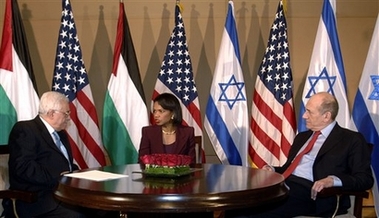Olmert stresses Mideast Quartet tenets
(AP)Updated: 2007-02-22 14:50
|
In this photo released by the United States Embassy in Tel Aviv, United States Secretary of State Condoleezza Rice, center, sits with Palestinian Authority President Mahmoud Abbas, left, and Israeli Prime Minister Ehud Olmert, right, at a meeting at a hotel in Jerusalem, Monday, Feb. 19, 2007.[AP] |
JERUSALEM - Israel's prime minister spelled out a tough line Wednesday against Iran, Syria and an emerging Palestinian government, urging the international community to take a firmer stance against Tehran's nuclear ambitions and saying the Jewish state has no interest in talking to those who support violence.
Ehud Olmert also defended his much-criticized war in Lebanon and called Muslim complaints against Israeli construction near a Jerusalem holy site an attempt to stir up hatred.
Speaking at an annual news conference with foreign journalists, Olmert said his government would not do business with a Palestinian unity government that refuses to accept the conditions of the so-called Quartet of Mideast peace brokers: recognize Israel, renounce violence and accept past peace deals.
"Israel will not be able to maintain any kind of formal or practical contact with a government that will not accept explicitly the principles of the Quartet," he said.
Attempting to quell months of internal fighting, Hamas militants and the moderate Fatah Party of Palestinian President Mahmoud Abbas recently reached a unity deal in Mecca, Saudi Arabia, that includes a vague reference to "respecting" past peace accords, but falls short of meeting the other two international demands.
Abbas, Olmert and Secretary of State Condoleezza Rice held a rare three-way summit in Jerusalem on Monday, but the talks achieved little after both Israel and the U.S. made it clear there will be no future dealings with an unrepentant Hamas, which both nations deem to be a terrorist organization.
Olmert, however, said he will continue to hold talks with Abbas and work to improve the lives of Palestinians.
"We believe that however mistaken their leadership can sometimes be, people don't have to suffer for the mistakes of the leaders," Olmert said.
The prime minister expressed support for a Palestinian state alongside Israel, but said that will be hard to achieve in light of last year's victory by Hamas in parliamentary elections.
"The fact is that indeed the majority among the Palestinians voted for people who don't want to make peace with Israel, and without a change among the Palestinians it will be very difficult to accomplish this," he said.
Asked if Israel might react positively to signals from Syria that it's ready to enter peace negotiations, Olmert said that country's support for militants precludes such talks.
"We are interested in peace, not in the industry of peace ... not in helping Syria pretend that it's a peace-loving country," he said.
Olmert criticized Syria for supporting Hezbollah in Lebanon, and defended Israel's performance in last summer's 34-day war against the guerrillas, saying Hezbollah "is weaker, much weaker than they were."
That war, and the Israeli public's perception that Olmert and his team had bungled it, helps explain the prime minister's extraordinarily low approval rating, now below 20 percent.
Many Israelis believe the war's inconclusive results damaged their country's long-term deterrence, increasing the likelihood of another war with Hezbollah or even its sponsor Iran.
Olmert urged the international community to increase its pressure on Iran as a deadline for Tehran to halt its uranium enrichment activities ran out.
The U.N. Security Council gave Iran until Wednesday to freeze enrichment, a process that can be used to produce nuclear weapons. Officials at the U.N. nuclear watchdog agency were putting the finishing touches on a report expected to say that Iran has expanded its enrichment efforts instead of freezing them.
The council imposed limited sanctions on Iran in December.
"Today is the last day that was designated by the international community and by U.N. Security Council Resolution 1737," Olmert said. "Therefore the international community will have to think of additional measures."
|
||
|
||
|
|
